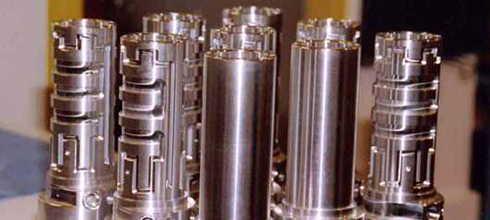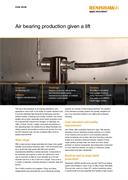Bu sayfa şu anda sizin dilinizde mevcut değildir. Google'ın Çeviri sistemini kullanarak
otomatikleştirilmiş çeviriye
ulaşabilirsiniz. Bu hizmeti sağlamaktan sorumlu değiliz ve çeviri sonuçları tarafımızdan kontrol edilmemiştir.
Eğer daha fazla yardıma ihtiyaç duyarsanız lütfen
bizim ile temasa geçiniz.
Air bearing production given a lift
The rise in the popularity of air bearing spindles for new applications owes much to the ability of modern machine tools to provide extremely tight dimensional tolerances and fine surface finishes. Achieving such results, however, can involve lengthy set-up times; especially where batch production must be combined with frequent tool changes.
Air Bearings Ltd (ABL) of Poole, Dorset, a highly successful manufacturer in this expanding field, has tackled this by fitting Renishaw tool setting systems and spindle-mounted touch probes. Not only has this reduced costs, but also sustained ABL's drive for quality improvements.
With a basic product range extending from large, ‘slow-speed' spindles and powerful motorised units (1 kW and 80,000 rpm) up to small ultra high-speed (250,000 rpm) spindles, manufacturing flexibility is clearly important. Components to be machined, the majority of which are cylindrical in form, vary in size from as little as 5 mm diameter up to 85 mm diameter and from 3 mm to 235 mm in length. They come in a variety of materials, including aluminium, stainless steel and bronze.
Two of ABL's machine tool suppliers, Fanuc and Haas, independently recommended the use of Renishaw probing systems as a means of improving productivity. The adoption of the Renishaw probing systems has greatly simplified set-ups in two important respects: tool setting and workpiece checking.
John Read, ABL's workshop supervisor, says: “We recently introduced various Renishaw probing systems on a number of our machine tools as part of a cost reduction exercise aimed at reducing set-up times.
We found that they could also enable us to introduce multi-load fixtures, instead of using single loading, because they can create and store datum positions on several components. By probing each component on such multi-load fixtures, our policy of continuous quality improvement has been maintained.”

Small as well as large batch production
Renishaw's OMP40 spindle probe and the TS27R tool setting system are installed on each of four of ABL's Fanuc Robodrills. They are also used on a Haas VF1 vertical machining centre, a machine with four-axis capability that handles a high volume of work with a minimum number of operations. OMP40 probes are also used on two of ABL's Olympic Seiki vertical twin-pallet machines, together with Renishaw TS32S tool setting systems.
The TS27R is a highly flexible, cost effective tool-setting probe for vertical applications. Its compact and robust design allows simple fitting to the machine bed and can be used to set tool lengths in Z and rotating tools in X and Y, for radius offsets. The Renishaw TS32S, with infrared transmission of the probe signal, is used on the Olympic Seiki verticals because these machines utilise twin pallet load/unload systems which would not allow hard-wired systems.
The OMP40 spindle-mounted probes have proved to be perfectly suited to the small machines. They are primarily used running on a batch production basis for component referencing and inspection tasks.
Higher productivity
Founded in 1993, ABL rapidly established itself as a quality supplier of ‘competitively priced air bearing spindles that offer a superior performance'. These are sold for use within a variety of specialist applications and the company has won three prestigious Queen's Awards for Enterprise.
Says ABL's managing director, Mr Kelly Henocq: “Currently, many of our completed spindle assemblies are destined for installation into special-purpose machines designed to drill printed circuit boards. These ‘state-of-the-art' production units require the spindles to operate at speeds as high as 300,000 rpm, as well as demanding extremely high dimensional accuracy (with drill run-out to less than 5 microns) throughout the entire speed range”.
ABL is delighted with the dramatic timesaving on job setting that has been achieved, along with the added benefits of increased quality on batches of multiple components. ABL's machining operation puts the company in a more competitive position and it feels well equipped for future developments.

